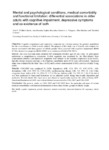Mostrar o rexistro simple do ítem
Mental and psychological conditions, medical comorbidity and functional limitation: differential associations in older adults with cognitive impairment, depressive symptoms and co-existence of both
| dc.contributor.author | Millán-Calenti, José Carlos | |
| dc.contributor.author | Maseda, Ana | |
| dc.contributor.author | Rochette, Sophie | |
| dc.contributor.author | Vázquez, Gustavo A. | |
| dc.contributor.author | Sánchez, Alba | |
| dc.contributor.author | Lorenzo, Trinidad | |
| dc.date.accessioned | 2015-03-09T08:51:33Z | |
| dc.date.available | 2015-03-09T08:51:33Z | |
| dc.date.issued | 2010-12-10 | |
| dc.identifier.citation | Millán-Calenti JC, Maseda A, Rochette S, Vázquez GA, Sánchez A, Lorenzo T. Mental and psychological conditions, medical comorbidity and functional limitation: differential associations in older adults with cognitive impairment, depressive symptoms and co-existence of both. Int J Geriatr Psychiatry. 2011;26:1071-1079 | es_ES |
| dc.identifier.uri | http://hdl.handle.net/2183/14199 | |
| dc.description.abstract | [Abstract] Objective: Cognitive impairment and depressive symptoms are common among the geriatric population but the co-occurrence of both is rarely studied. The purpose of this study was to identify and compare the factors associated with three groups of elderly people: those assessed with cognitive impairment alone (COG), depressive symptoms alone (DEP) or co-existence of both (COG-DEP). Methods: The cross-sectional study included 600 community-dwellers ages 65 and older. All participants underwent a comprehensive evaluation. Global cognition was measured by the Mini-Mental State Examination (MMSE) and depressive symptoms were defined by the Geriatric Depression Scale (GDS). Specific chronic illnesses relevant to the Charlson comorbidity index (CCI) were self-reported. Functional status was evaluated by the Katz’ basic (ADL) and Lawton’s instrumental (IADL) activities of daily living scales. Results: COG-DEP was explained by IADL dependence (OR: 11.9, 95% CI: 4.59–30.78), ADL dependence (OR: 11.5, 95% CI: 5.59–23.69), cerebrovascular disease (OR: 3.6, 95% CI: 1.48–8.68), congestive heart failure (OR: 3.4, 95% CI: 1.77–6.59) and diabetes (OR: 2.6, 95% CI: 1.30–5.18), but it was best predicted by functional limitations in the adjusted model. Being functionally dependent and medically ill with shorter life expectancy was shown to significantly increase the odds of being DEP. Functional limitation in IADL was without distinction associated to COG, DEP and COG-DEP. Conclusion: The present results on COG, DEP and COG-DEP show the particular relevance of certain medical comorbidities and functional limitations to those three distinct groups of elderly people. | es_ES |
| dc.language.iso | eng | es_ES |
| dc.publisher | John Wiley & Sons | es_ES |
| dc.relation.uri | http://dx.doi.org/10.1002/gps.2646 | es_ES |
| dc.subject | Cognitive impairment | es_ES |
| dc.subject | Geriatric depression | es_ES |
| dc.subject | Medical comorbidity | es_ES |
| dc.subject | Functional limitation | es_ES |
| dc.subject | Life expectancy | es_ES |
| dc.subject | Elderly people | es_ES |
| dc.title | Mental and psychological conditions, medical comorbidity and functional limitation: differential associations in older adults with cognitive impairment, depressive symptoms and co-existence of both | es_ES |
| dc.type | info:eu-repo/semantics/article | es_ES |
| dc.rights.access | info:eu-repo/semantics/openAccess | es_ES |
Ficheiros no ítem
Este ítem aparece na(s) seguinte(s) colección(s)
-
GI-GIGG - Artigos [113]






